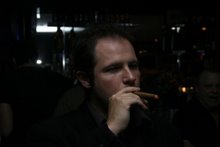I get a lot of "What does a _________ do on a film set?" questions. It's understandable. A number of film jobs have cryptic names. Many radically different jobs have decidedly similar designations. That, and our professions are open to public scrutiny in a way that they are not for other industries thanks to the ending credits. On the whole, the public just doesn't understand what we all do.
The one that's got to take the cake, though, is the Gaffer. Maybe tied with Best Boy, Gaffer is the job title that film laypeople are least likely to understand. I even had two different professors in film school, both of which were film academics, not professional film makers, who failed to understand the term.
Simply, the Gaffer is the head of the electrical department. Virtually everything on set that runs on electrical power comes back to or is reliant upon the Gaffer and his/her team. Most notably, this includes all of the lights used to compose a shot but it also includes a vast array of other items. While operating generators and providing electricity to the other departments on location is one of the electrical department's two main priorities, that particular set of tasks is normally delegated to the Gaffer's right hand, the Best Boy Electric. The Gaffer, meanwhile, is the Director of Photography's go-to. He or she orchestrates all of the lighting and is responsible for all of the attendant equipment and expertise.
The degree of autonomy a Gaffer has varies greatly depending on the director and DP. Some DP's simply indicate a general direction and intensity of light and leave the rest to the Gaffer. He or she chooses the lighting instruments and coordinates with the Grip department for the manipulation of that light. Others DP's dictate minute specifics intending the Gaffer merely to implement the setup. The knowledge base of the DP and the Gaffer overlap greatly and while most DP's begin as AC's, moving up through the camera department, it is not at all unusual for a Gaffer to become a DP.
The origin of the term is uncertain but I've heard two tales that are related and equally plausible. The first is that, in the early days of fiction film making lights and skylights were manipulated using long hooks that took tremendous physical strength to use. The people manipulating them were often recruited from the merchant marine because a similar type of long hook, called a gaff hook, and an equal degree of upper body strength was needed in the loading of sea cargo. Additionally, gaffer is English slang for an old man; 'geezer' is the American equivalent. Because Gaffer is a job that requires great technical savvy and experience the head lighting technician was traditionally one of the oldest members of the crew. A hybrid possibility is that, as manually loaded cargo ships gave way to more modern styles of transport, older seamen found their skills obsolete in the merchant marine and many of them found employment in the film industry.
Gaffers are, almost by definition, one of the most experienced, most technically skilled and most respected people on a film set and in the film industry. The job garners great prestige among professional film technicians. It takes a lifetime to learn and master the Gaffer's craft, learning to be one part painter of light, one part military commander and one part hostage negotiator. Without a gaffer, a movie is just a blank screen.
My hat is off to anyone who succeeds at this, most challenging, of film professions.
Subscribe to:
Post Comments (Atom)


1 comment:
Well said.
My explanation was always this:
The Grip moves the Mole-Richardson's off the truck and into their approximate location.
The Gaffer plugs them in and aims them when the DP isn't looking.
95% of the time, the lights never get adjusted by the DP.
Gaffers were some of the best people I met on set, perhaps only second to the cameramen in terms of crew respect.
Gaffers were the guys you could count on to show up on location, look around, and then shimmy up an 80 ft. electrical pole to steal/drop/jerryrig the power needed for a shoot. Watching them do that always made me sick to my stomach with worry.
That's why I never aspired to be more than a grip.
Post a Comment